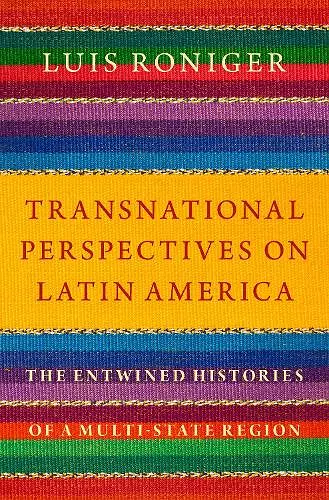Transnational Perspectives on Latin America
The Entwined Histories of a Multi-State Region
Format:Hardback
Publisher:Oxford University Press Inc
Published:24th Mar '22
Currently unavailable, and unfortunately no date known when it will be back

Latin America is a region made up of multiple states and societies with a diversity of races, ethnicities, and cultures. These states share historical legacies, cultural backgrounds and institutional frameworks, as well as political and socioeconomic challenges--but can one say they share a "regional perspective," if such perspectives even exist? In Transnational Perspectives on Latin America, Luis Roniger argues that the notion of Latin America is significant for understanding these societies' multiple connections and spillover across state boundaries. He claims that cross-border networks, a protracted concern and at times involvement in the affairs of neighboring states have shaped the region's modern character as much as the process of nation-state formation. Geopolitical, sociological, and cultural trends molded a contiguity of influences, leading sometimes to state confrontations, but overall, shaping a transnational arena of connected histories, interactions, and visions, complementing the process of separate nation-state formation. The book offers fresh readings of the dynamics of this region of multiple societies that have shared historical and cultural connections and developed divergent paths while unable to fully disengage from one another. Its chapters analyze persisting forms of circulation and articulation of networks, practices and ideas crossing international borders. Among the topics covered are political exile; the interface of state building and transnationalism; wars and the diffusion of conspiracy theories; the transnational imprint of the Cold War and democratization; social movements and transnational solidarity; states' geopolitical shifts and their impact on Jewish and Muslim citizens. The book closes with a chapter on twenty-first century dilemmas and challenges, including the process of segmented regional integration, state accountability, the vitality and limits of citizenship regimes, and pandemic politics.
This wide-ranging, erudite work reads more as a collection of essays elaborating on a common theme from different angles. * J. M. Rosenthal, CHOICE *
A comparative political sociologist fluent in the languages and epistemologies of history, sociology, anthropology, and political science, Luis Roniger draws on the most incisive insights from these disciplinary approaches to reveal in brilliant colors the nature and effects of transnationalism in Latin America. Perceptive, timely, and wise, this book belongs on the shelf of every student and scholar of the region. * Max Paul Friedman, Professor of History and International Relations, American University *
At a time when Latin American studies (like other academic fields) is becoming ever more atomised between competing disciplines each with their own technical apparatus, Luis Roniger's new book provides a bold counter-blast. His professional mastery of the tools and concepts of comparative historical sociology provide a firm basis for an integrative project, highlighting the transnational and multiple modernity features of Latin American reality. Healso deploys his expertise in diaspora studies, state formation, multiple modernities, and local history and culture to enrich his analysis with close focus on well-chosen and revealing specific examples—all woven together into an engaging tapestry that will provoke and inspire across the whole field of study. * Laurence Whitehead, Nuffield College, Oxford *
ISBN: 9780197605318
Dimensions: 157mm x 224mm x 33mm
Weight: 590g
336 pages